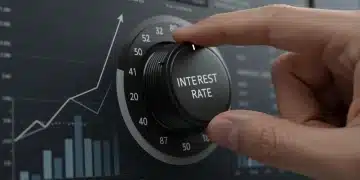Credit card debt rise: what you need to know

Anúncios
Credit card debt rise is driven by increased consumer spending, high-interest rates, and a lack of financial literacy, making it essential to budget, prioritize payments, and seek professional help when needed.
Credit card debt rise is becoming a pressing issue for many. Are you feeling overwhelmed by your balances? Understanding the reasons behind the increasing debt can help you take control.
Anúncios
Understanding the current credit card debt trends
Understanding the current credit card debt trends is essential for anyone managing personal finances. With debt levels rising, it’s important to recognize how these trends can affect individual financial health.
Recent studies show that many consumers are facing increased credit card balances due to various factors. Increased spending during economic recovery and rising interest rates play significant roles in this trend.
Anúncios
Impact of Economic Factors
The economy can deeply influence credit card debt. For instance, when the economy grows, people tend to spend more, leading to higher debt levels. However, when financial challenges arise, individuals may find it harder to manage repayments. This creates a cycle of debt that can be hard to escape.
Indicators of Rising Debt
- Higher average credit card balances per household.
- Increased use of credit cards for everyday purchases.
- More people are only making minimum payments.
As these indicators show, many people rely on credit cards more than ever. Yet, this can lead to financial strain. The increasing interest rates can also make it harder for individuals to pay off their debts, which only adds to the problem.
Changing Consumer Behavior
Furthermore, the way consumers use credit cards is changing. More individuals feel comfortable accumulating debt when they see it as a normal part of life. While some manage to pay off their balances each month, many struggle to keep up.
Understanding these trends helps individuals make informed decisions about their finances. Recognizing the importance of budgeting and monitoring credit card usage can significantly affect their financial stability.
Factors contributing to the rise of credit card debt

Many factors contribute to the rise of credit card debt. Understanding these elements is crucial for anyone trying to manage their finances effectively. Economic conditions, consumer behavior, and marketing practices all play significant roles in this growing trend.
One of the main reasons is the increase in consumer spending. As people feel more confident in the economy, they tend to spend more, often relying on credit cards. This spending can quickly accumulate when facing unexpected expenses or lifestyle changes.
Influence of Economic Conditions
The state of the economy directly influences credit card usage. When unemployment rates drop and wages rise, consumers feel secure. However, economic downturns can lead to heightened spending on credit cards, as people may need to finance necessities.
Changing Consumer Behavior
- Consumers often prioritize convenience over debt awareness.
- There is a growing acceptance of credit card debt as a norm.
- Rising costs of living push individuals to use credit cards more frequently.
This shift in behavior mimics societal trends. As more individuals view credit as a typical part of life, the cycle of debt can spiral. Lack of financial education also plays a part, as many consumers do not fully understand the repercussions of high credit card balances.
Furthermore, aggressive marketing tactics by credit card companies often encourage users to spend beyond their means. With promotional offers and cash-back incentives, it’s easy to accumulate debt quickly. These factors together create a challenging environment for anyone trying to keep their credit card debt in check.
How credit card debt affects your financial health
The impact of credit card debt on your financial health can be significant. Understanding how this type of debt affects your overall finances is essential for achieving stability. High balances can lead to stress and financial difficulties.
One of the primary effects of credit card debt is higher monthly payments. When you carry a balance, you incur interest charges that add to your expenses. This can quickly consume a larger portion of your budget, making it challenging to save.
Impact on Credit Score
Moreover, credit card debt directly affects your credit score. The more debt you have relative to your credit limit, the lower your score may drop. A lower score can increase interest rates on future loans, making borrowing more expensive.
Stress and Anxiety
- Debt can cause significant stress and anxiety.
- Many people feel overwhelmed by their monthly payments.
- High debt levels may lead to mental health issues.
The pressure of owing money can be mentally exhausting. Many individuals report feeling anxious or stressed about their finances, which can impact their overall well-being. This emotional toll is often overlooked but is crucial for understanding the consequences of credit card debt.
Additionally, high levels of debt can impact future financial decisions. People often avoid applying for loans or mortgages out of fear of rejection. This avoidance can prevent them from making significant life purchases, such as buying a home or investing in education.
In summary, the implications of credit card debt extend beyond just financial health. They affect emotional well-being and future financial opportunities as well. Recognizing these consequences is the first step toward taking control of your financial situation.
Practical tips to manage and reduce credit card debt

Managing and reducing credit card debt can seem daunting, but there are practical steps you can take. Knowing where to start makes the journey easier and more attainable. By implementing a few strategies, you can regain control over your financial situation.
One effective method is to create a budget. Tracking your income and expenses helps you see where your money goes. This awareness is crucial for identifying areas where you can cut back on spending.
Setting Up a Payment Plan
Establishing a payment plan is another key strategy. Focus on paying more than the minimum payment each month. This helps reduce the principal balance faster and lowers the interest you pay over time.
Consider the Snowball or Avalanche Method
- The Snowball Method focuses on paying off your smallest debts first.
- The Avalanche Method prioritizes debts with the highest interest rates.
- Both methods can motivate you to tackle your debt more effectively.
In addition, consider transferring your balances to a credit card with a lower interest rate or a zero-interest promotional offer. This can help reduce the overall cost of your debt if managed carefully. However, read the terms and conditions to avoid hidden fees.
Another useful tip is to limit your credit card usage while you manage your debt. This involves using cash or debit cards for everyday purchases. Reducing reliance on credit cards helps avoid accumulating additional debt and allows you to focus on paying down existing balances.
Lastly, seek professional help if needed. Financial advisors can provide personalized advice and help develop a tailored plan to suit your specific situation. Don’t hesitate to reach out for guidance.
The role of financial literacy in combating debt
Financial literacy plays a crucial role in combating debt. Understanding personal finance helps individuals make informed decisions about spending and saving. Without this knowledge, people may find themselves overwhelmed by financial obligations and unable to see a path to recovery.
Having a strong grasp of basic financial principles is the first step toward managing debt effectively. This includes knowing how to create a budget, track expenses, and set financial goals. When individuals understand their financial situation, they can make better choices.
Importance of Budgeting
Budgeting is a vital skill. It allows individuals to allocate their income wisely. A well-planned budget can help highlight areas where spending can be cut. This can free up funds to pay down credit card debt and other financial responsibilities.
Understanding Interest Rates
- Many people do not fully understand how interest rates affect debt.
- Higher rates can lead to significantly more money owed over time.
- Knowing how to shop for lower rates can reduce overall costs.
Additionally, understanding the effect of interest rates on debt is essential. High-interest rates can increase the amount owed dramatically over time. People who are financially literate are better equipped to seek lower rates and make decisions that minimize their debt burden.
Education about debt management also fosters smarter borrowing behavior. Those who understand the risks of accumulating debt are more likely to use credit responsibly, avoiding unnecessary financial burdens. Moreover, financial literacy encourages individuals to seek assistance when needed. Recognizing when to ask for help can prevent a debt crisis.
In essence, enhancing financial literacy is a powerful tool in the fight against debt. It empowers individuals to take control of their finances, make educated decisions, and develop a sustainable financial future.
FAQ – Frequently Asked Questions about Credit Card Debt Management
What should I do first if I have credit card debt?
Start by creating a budget to track your income and expenses. This will help you understand your financial situation better.
How can I reduce my credit card debt effectively?
Focus on paying more than the minimum payment, prioritize high-interest debt, and consider consolidating your debt if possible.
Is financial literacy important for managing debt?
Yes, financial literacy helps you make informed decisions about budgeting, spending, and savings, which is crucial for managing debt.
When should I seek professional help for my debt problems?
If you feel overwhelmed or unable to manage your debt on your own, consider consulting a financial advisor for personalized advice.





